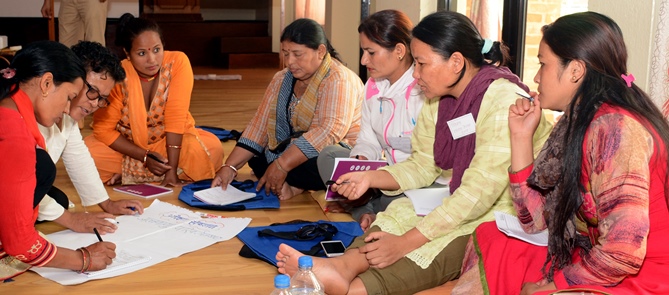
Two days orientation on Gender and Financial Accountability in Climate Change

With significant devolution of decision-making powers from the Central to the Local Governments under the country’s new federal structure, the Municipalities and Rural Municipalities can now formulate and implement laws, policies and plans on their own. However, there is a risk of these Local Governments not being transparent and accountable, and neglecting gender, climate change and environment issues, focusing more on infrastructure. In this context the role of grassroots women and their organizations becomes all the more timely and crucial. This is also an opportunity for them to advocate for gender-informed Local Government level laws, policies and plans including accountable and gender sensitive climate actions and climate financing.
Against this background Prakriti Resources Centre (PRC) and TEWA jointly organized a orientation programme with the support of Both ENDS to enhance knowledge and capacity of grassroots level women in the areas of climate change, climate finance and gender equality. A total of 23 grassroots level women representing 20 CBOs including TEWA participated in two days orientation “Gender and Financial Accountability in Climate Change” organized on 24 and 25 June 2018.
During the two days orientation, participants were familiarized with the concept of adaptation, mitigation and climate finance, and national and international policies and programmes relating to climate change. Discussions were held on why women’s rights should not be isolated from climate actions and financing, and the grassroots women’s role in the process of planning and budgeting at local government level. The objective was achieved through lectures, plenary discussions, brainstorming, case simulations, group work and panel discussion.
The first day of the orientation was mainly focused on the introduction of climate change and its impact in Nepal, methods to respond to the impacts of climate change, and local level budgeting and planning process. Participants also exercised a case simulation, reflecting on the impacts of climate change they are facing in their communities and identified the methods of adaptations. Prabin Man Singh, PRC facilitated a brainstorming, supporting the participants to identify different environmental problems they are faced with and classify them as climate induced and non-climatic using climatic parameters. A presentation by Pradeep Bhattarai, PRC familiarized the participants with the difference between weather and climate, Green Houses Gases and impacts of climate change in Nepal.
C& D Dialogue member Dharam Uprety talked the participants through various climate change adaptation and mitigation measures emphasizing that well planned early adaptation actions can save money and lives. Ek Raj Sigdel, local planning expert, made a presentation on planning and budgeting process at Local Government level. He spoke about the lack of adequate knowledge and capacity at local level in the area of project prioritization, proper planning and budgeting, although the Local Level Plan and Budget Preparation Guideline 2017 is in place.
On the second day of the orientation, participants were familiarized with key institutions, policies and programmes concerning climate change in Nepal. The second session of the day on climate change and gender, by PRC’s Sarika Rai focused on why women are disproportionately affected by impacts of climate change and disasters including reasons for women lagging behind in addressing these problems. Sharing her views on orientation, Lalita Tamang from Himali Jadibuti Utpadan Sahakari (Mountain Herbs Production Cooperatives), Rasuwa said,
“It’s so inspiring to learn in this programme that women have equal right to participate in and influence decision making in climate change issues. I will share my learning with my friends in my organization and community.”
Raju Pandit Chhetri, PRC engaged the participants in discussion on the importance, sources and availability of climate finance. He informed the participants that federal and local governments, international agencies, I/NGOs and the private sector are the major sources of finance for climate change adaptation and mitigation in Nepal. A panel discussion involving three panelists Sunil Acharya, Sita Sunar and Nirmala Shrestha led to the conclusion of the day.
It is highly encouraging that the participants came up with various useful practical ideas and expressed enthusiasm about translating the ideas into reality, back home.
For detail report, please click here: Report
